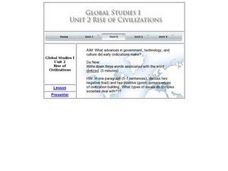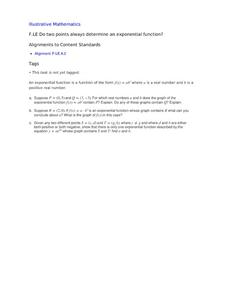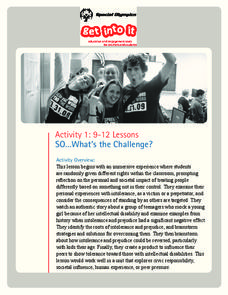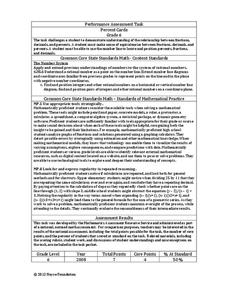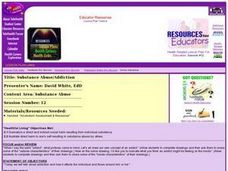Curated OER
Growing up in Las Vegas; Memories of Childhood in the Neon City
Students investigate the history of Las Vegas through conducting interviews. In this oral history lesson, students locate and speak with older residents of Las Vegas in order to gain a better understanding of the city. Students create...
Curated OER
How Bad Can It Get
Students outline solutions for what would happen if we had an oil shortage. In this oil shortage lesson plan, students research and discuss an oil crisis that can occur and what would happen to society if it did.
Curated OER
Overcurrent Protection
In this electrical worksheet, students answer a series of 13 open-ended questions with schematics about excessive electrical current going through conductors. This worksheet is printable and there are on-line answers to the questions.
Curated OER
A Day In My Life
Learners brainstorm how they can conserve energy in their daily lives. In this energy lesson plan, students discuss how they use energy and ways to conserve it.
Curated OER
Global Studies I: Rise of Civilizations
Providing a list of presentations on a variety of topics focused on the development of civilizations throughout the world, this resource could be used in both an upper elementary or high school class. A few important topics covered are...
Council for the Curriculum, Examinations and Assessment
Feelings and Emotions
The focus of the second in a 10-session course on Social, Physical, Emotional, Cognitive and Spiritual (SPECS) health is on learning to express and manage feelings appropriately. Class members learn different ways of identifying, coping...
Childnet International
Crossing the Line: Sexting
Technology may be changing every day, but peer pressure remains difficult for teenagers to resist. After watching a video about feeling pressured to text provocative pictures, middle schoolers learn about the laws and school policy...
Curated OER
Understanding the Basics of the Behaviorist Theory
Ideas gleaned from the behaviorist theory may help equip you with classroom management tools.
Curated OER
Do Two Points Always Determine an Exponential Function?
Algebra learners explore, analyze and build an exponential equation given its form and a specific point that exists on the function in this task. The last question asks learners to apply their ideas to an exponential equation given two...
Curated OER
Sentence Completion: High-Intermediate Level
Learners can practice their reading strategies and comprehension skills with a sentence completion worksheet that comes with a detailed answer key. Whether you use the worksheet as an assessment or as a group or individual practice...
Curated OER
Changes, Choices, and Lessons
The teen years are nothing but a series of personal, social, and academic changes. Help kids understand what to expect as they mature and give them ways to make good decisions. After discussing they types of changes they'll go through,...
Visa
Money Responsibility
Introduce young learners to the important life skill of responsibly managing money and recording how much they spend and save.
Special Olympics
SO…What’s the Challenge?
What does it feel like to be the victim of intolerance? Class members engage in activities, watch a video, and reflect on their own experiences with intolerance or discrimination before creating a project designed to combat intolerance...
Oklahoma State Department of Education
Narrative Prompt
Reading about history is nothing like experiencing it firsthand. Encourage your eighth graders to do the next best thing with a historical narrative prompt, in which they describe the experience of a first-time traveler on the...
PBS
Facts vs. Opinions vs. Informed Opinions and their Role in Journalism
Do reporters write about what they see, or what they think? Examine the differences between investigative writing and opinion writing with a lesson from PBS. Learners look over different examples of each kind of reporting, and convince...
Global Oneness Project
Deconstructing Consumerism
To increase awareness and launch a discussion of consumerism, class members view What Would It Look Like, a 25 minute film of images that capture the global effects of the consumption of goods. Viewers make a list of the images that they...
Noyce Foundation
Percent Cards
Explore different representations of numbers. Scholars convert between fractions, decimals, and percents, and then use these conversions to plot the values on a horizontal number line.
Inside Mathematics
Quadratic (2009)
Functions require an input in order to get an output, which explains why the answer always has at least two parts. After only three multi-part questions, the teacher can analyze pupils' strengths and weaknesses when it comes to quadratic...
EngageNY
Multiplication of Numbers in Exponential Form
Develop a solid understanding of multiplication and division properties of exponents. Individuals expand exponential terms to discover the patterns and create the properties in the second installment in a series of 15. The activity...
Nemours KidsHealth
Drugs: Grades 9-12
What do drugs do to the body and to the mind? What are the dangers of using drugs? How can teens respond to the pressure to use drugs? After reading a series of articles related to drug use and abuse, class members prepare a skit to...
Curated OER
Clean Coal Technology
In this clean coal activity, students click on the links to learn more about clean coal technology and answer short answer questions about it. Students complete 12 questions total.
Curated OER
Doing Our Jobs
First graders identify traits of good listeners and speakers and role-play these traits in pairs. They brainstorm acceptable and unacceptable behaviors for the classroom and identify what jobs are appropriate for first-graders to perform...
Curated OER
Substance Abuse/Addiction
Young scholars examine addictions and the effects on people around them. They identify the characteristics of addition and indicators of alcohol abuse. They complete a worksheet for homework.
Curated OER
The Right Choice
Students discuss past decisions they have made and decisions they are currently faced with. They discuss the steps of the decision-making process and practice using them to solve real life problems.






